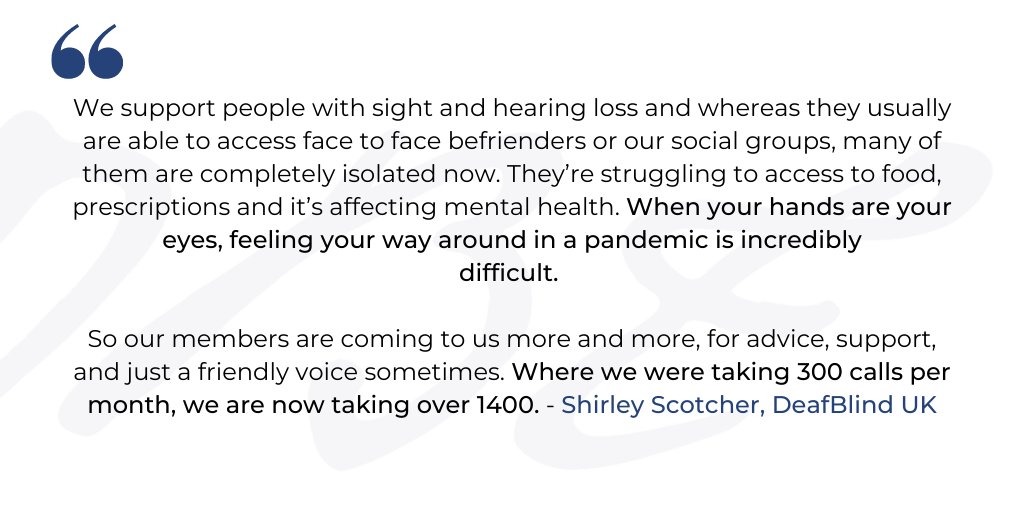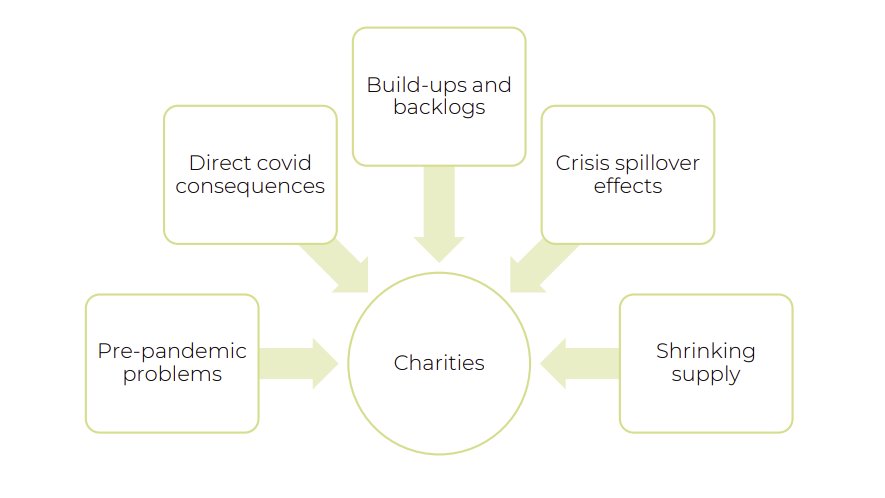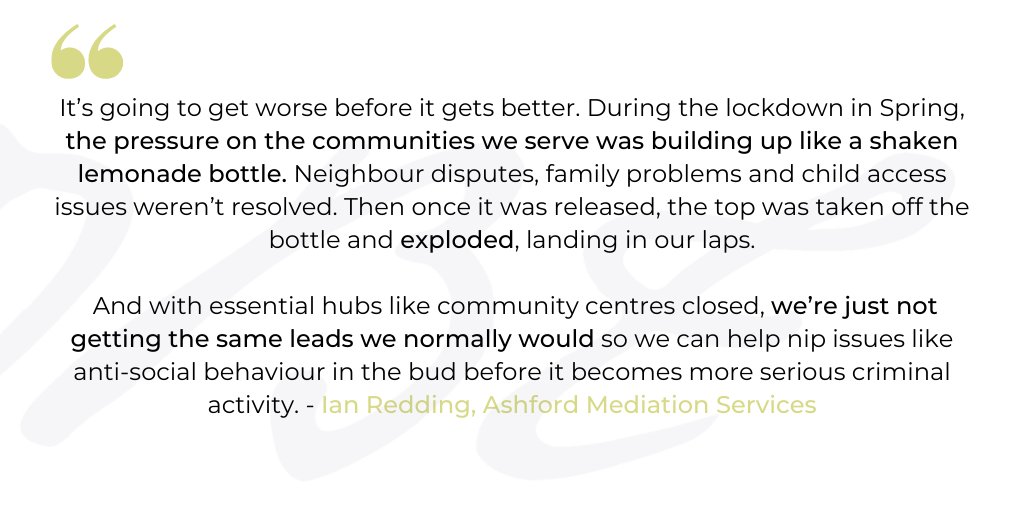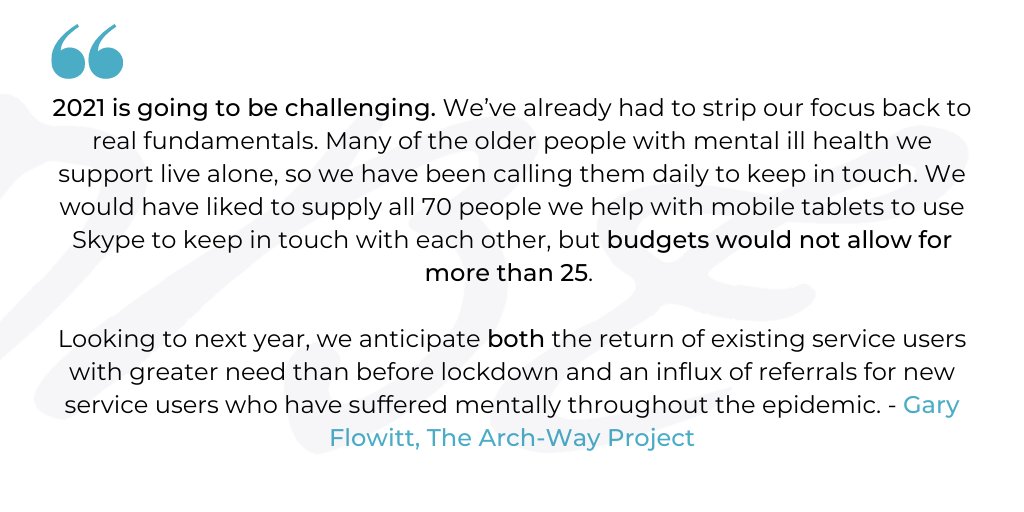
I know, I know. A lot of news today. But gimme like… 70% of your attention for 2mins.
We know that charities have seen a buttload of additional demand this year. 55% tell @probonoecon they may not be able to service it all. But where’s it coming from? This gives us a clue (1/)
We know that charities have seen a buttload of additional demand this year. 55% tell @probonoecon they may not be able to service it all. But where’s it coming from? This gives us a clue (1/)
Charities like @DeafBlindUK make up some of the 19% seeing more demand from their existing clients as they help them literally navigate the pandemic.
For them, it's mostly the first kind of demand we've identified - direct Covid consequences such as loneliness, isolation etc (2/)
For them, it's mostly the first kind of demand we've identified - direct Covid consequences such as loneliness, isolation etc (2/)

Then, sure, there are crisis spillover effects. Foodbanks are definitely making up some of the 39% with existing service users needing more help AND new people coming to them.
But (SPOILERS) there are 3 other kinds of demand charities are facing we should pay attention to (3/)
But (SPOILERS) there are 3 other kinds of demand charities are facing we should pay attention to (3/)

1⃣ Backlogs and build ups of demand. I know, you've seen the front page of @Independent today, you know all about the 1million cancelled operations and heard @macmillancancer warn about waiting lists.
But what about the effects of backlogs on social outcomes? (4/)
But what about the effects of backlogs on social outcomes? (4/)
🚫Community centres are closed
🏠Families are stuck and isolated
💻27% of charities had to cut services because they/their users lacked tech/skills
So opportunities for early intervention in social issues like youth offending have been cut off. And problems are now worse (5/)
🏠Families are stuck and isolated
💻27% of charities had to cut services because they/their users lacked tech/skills
So opportunities for early intervention in social issues like youth offending have been cut off. And problems are now worse (5/)
This is exactly what @archwayproject told me they were worried about.
(Also Ian joked about how they couldn't afford champagne even for their metaphors, which I appreciated) (6/)
(Also Ian joked about how they couldn't afford champagne even for their metaphors, which I appreciated) (6/)

Today's new figures survey figures from @probonoecon show:
75% of charities expect demand to go ⬆️ in 2020
83% expect income to go ⬇️
So how do you clear the backlog and tackle ongoing demand? What falls through the cracks? (7/)
75% of charities expect demand to go ⬆️ in 2020
83% expect income to go ⬇️
So how do you clear the backlog and tackle ongoing demand? What falls through the cracks? (7/)
And that point about ongoing demand matters too. It’s not like charities went into this crisis super chill. 4 in 5 charities saw demand rise in 2019.
Take core homelessness
In 2010: 120,000 people on a typical night
In 2017: 153,000
Pre-pandemic problems have intensified (8/)
Take core homelessness
In 2010: 120,000 people on a typical night
In 2017: 153,000
Pre-pandemic problems have intensified (8/)
There’s a fifth kind of ‘demand’ too – for individual charities anyway. Shrinking supply can see pressures transferred. When Age UK Suffolk closed in July, older people in Stowmarket and Bury St Edmunds didn’t stop needing support. They were transferred to other charities (9/)
(Sorry, earlier I said @archwayproject but meant @ashfmediation). This is what @archwayproject has to say.
We're talking about something happening right now. 9mos into this crisis, they haven't been able to raise enough to meet demand for some basic connectivity needs (10/)
We're talking about something happening right now. 9mos into this crisis, they haven't been able to raise enough to meet demand for some basic connectivity needs (10/)

How much more of that will we see in 2021? Current numbers say a fair bit.
You can read all more about the different fronts of demand charities are facing right now alongside the latest sector data in @ProBonoEcon's new report here. END (11/11)
probonoeconomics.com/news/press-rel…
You can read all more about the different fronts of demand charities are facing right now alongside the latest sector data in @ProBonoEcon's new report here. END (11/11)
probonoeconomics.com/news/press-rel…
• • •
Missing some Tweet in this thread? You can try to
force a refresh



